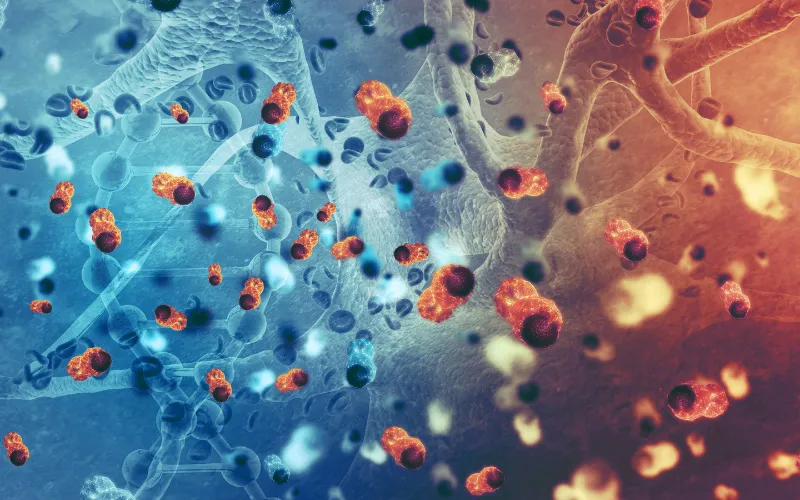
Nutrigenomics cancer prevention is transforming how we understand the link between diet, genetics, and cancer risk. Rather than relying on generic dietary guidelines, this field explores how specific nutrients interact with genetic variants to influence pathways like DNA repair, detoxification, inflammation, and epigenetic regulation. For practitioners, it shifts cancer prevention from a broad, population-level model to a precise, individualized strategy.
By customizing nutrition to a patient’s genetic profile, practitioners can move beyond surface-level dietary advice and address the molecular mechanisms that drive cancer development. While the science is still evolving, nutrigenomics cancer prevention holds a potential framework for building more effective, evidence-based interventions that align with each patient’s unique biology.
Key Takeaways
Nutrigenomics combines nutrition and genetics, offering a personalized approach to cancer prevention by understanding how specific nutrients influence gene expression.
Diet and genetic interplay can reduce cancer risk, with nutrients like folate, omega-3 fatty acids, and polyphenols supporting DNA repair, reducing inflammation, and improving overall cellular health.
Specific genetic variants may increase susceptibility to cancer, but targeted dietary adjustments, such as incorporating cruciferous vegetables or antioxidant-rich foods, can mitigate these risks.
Epigenetics highlights how lifestyle and diet affect gene behavior, showing that nutrients act as “dimmer switches,“ controlling the expression of genes linked to cancer prevention.
Nutrigenomic testing enables tailored dietary recommendations, helping healthcare practitioners create precise nutrition strategies for at-risk individuals.
A holistic approach combining diet, lifestyle, and professional guidance ensures the best outcomes, as diet alone isn’t enough to counter environmental and genetic cancer risk factors.
Table of Contents
Molecular Foundations of Nutrigenomics in Cancer Prevention
Nutrigenomics provides a framework for nutrition-based cancer prevention by examining how genetic variants interact with dietary inputs to influence cancer susceptibility. Instead of broad dietary guidance, this approach focuses on molecular mechanisms—DNA repair, detoxification, oxidative balance, and inflammatory regulation—where nutrients can directly alter gene expression. These insights form the foundation for clinical applications for nutrigenomics in cancer prevention strategies.
Genetic Determinants of Cancer Vulnerability
Polymorphisms in key genes alter how efficiently the body manages processes critical to cancer risk. Variants in MTHFR affect folate metabolism and DNA integrity; deletions in GSTM1 compromise detoxification; changes in CYP1A1 influence carcinogen breakdown; and mutations in BRCA pathways modify DNA repair capacity. Without targeted nutritional support, these variants can increase vulnerability to DNA instability and tumor development.
Epigenetic Regulation Through Nutrition
Dietary components act as regulators of gene expression through epigenetic modifications such as DNA methylation, histone modification, and microRNA signaling. Folate intake supports methylation pathways and reduces colorectal cancer risk in individuals with MTHFR variants. Omega-3 fatty acids modulate inflammatory gene expression, lowering progression risk, while polyphenols such as curcumin and resveratrol influence tumor-suppressor pathways.
Translating Pathways Into Clinical Strategy
By aligning dietary interventions with genetic profiles, practitioners can reduce the likelihood of molecular “misfires” that initiate carcinogenesis. This precision approach underscores the role of nutrition-based cancer prevention as a clinical tool—turning genetic vulnerabilities into points of intervention rather than inevitabilities.
Targeted Nutritional Approaches for Genetically At-Risk Patients
For patients with identified genetic susceptibilities, dietary interventions form a critical component of nutrition-based cancer prevention. The interaction between nutrients and gene expression directly influences DNA repair capacity, detoxification efficiency, oxidative balance, and inflammatory control. As such, clinical applications for nutrigenomics require diet design that actively addresses these pathways.
Nutrition Strategies Aligned with Genetic Variants
Adjusting nutrient intake to accommodate specific genetic profiles can reduce cancer risk:
Detoxification-related variants (e.g., GSTM1, CYP1A1): Recommend increased intake of cruciferous vegetables to provide sulforaphane, which enhances enzymatic detoxification and carcinogen clearance.
Estrogen metabolism variants: Encourage dietary inclusion of flaxseed lignans, soy isoflavones, and other phytoestrogens to support balanced estrogen metabolism, lowering risk of hormone-sensitive cancers.
Oxidative stress variants: Advise a diet high in antioxidants and glutathione precursors (e.g., berries, leafy greens, asparagus) to mitigate free radical–induced DNA damage.
These strategies should be integrated into structured nutrition plans, ensuring that genetic vulnerabilities are matched with nutrient-driven compensatory mechanisms.
Biochemical Nutrition for Cancer Risk Reduction
Understanding nutrient biochemistry allows practitioners to design protocols that support genomic stability and reduce carcinogenic potential:
Folate, B12, and choline – critical for DNA methylation and epigenetic stability. Clinical emphasis should be on sufficient intake via leafy greens, eggs, and fortified foods.
Vitamin D and omega-3 fatty acids modulate inflammatory pathways and immune signaling. Recommend dietary sources such as fatty fish and fortified products, with supplementation as clinically indicated.
Polyphenols (EGCG, curcumin, resveratrol) – influence tumor suppressor pathways and apoptosis signaling. Incorporate through targeted dietary advice or evidence-based nutraceuticals.
Fermentable fiber and microbiome support – promote short-chain fatty acid production, enhancing gut barrier integrity and reducing colorectal cancer risk. Sources include oats, legumes, and certain fruits.
By applying these biochemical principles, practitioners can move beyond generic dietary recommendations and deliver interventions that directly modulate cancer-related molecular pathways.

Nutrigenomic Testing in Clinical Practice
Nutrigenomic testing in practice is like revealing a personalized instruction manual for your body’s dietary needs. It gives you, as a medical practitioner, the tools to tailor nutrition plans that work not just for the average person but for your patient on a molecular level.
Available Tests for Practitioners
Panels that focus on gene-diet interactions, such as those assessing oncogenes or inflammation markers, truly highlight how far we’ve come. For example, tests often examine genes like MTHFR, GSTM1, or CYP1A1, which influence detoxification, DNA repair, and managing oxidative stress, which are all important for cancer prevention. These panels provide insights into whether a patient might need more cruciferous vegetables for refresh pathways or polyphenol-rich foods to combat inflammation. They’re like a nutritional GPS, guiding you toward smarter food recommendations.
That said, no test is perfect. Some current genetic panels focus primarily on individual genes (single-nucleotide polymorphisms or SNPs), which can lead to oversimplified advice. While platforms like Elite Gene Labs and others offer excellent starting points for exploring these genetic blueprints, they also highlight the need for integration. You can tell whether a patient is predisposed to low folate absorption, but it doesn’t mean one gene paints the whole cancer-risk picture. Combining these tests with your expert clinical skills ensures you use them wisely.
Interpreting Reports Beyond the Obvious
When it comes to reading genetic reports, it’s tempting to fixate on one SNP, like focusing on a single tree when there’s a whole forest to consider. Cue the term single SNP reductionism. Instead, you need to build broader polygenic risk scores and essentially look at multiple genes together to calculate someone’s risk for cancer more accurately.
Let’s say a patient’s report shows increased risk for oxidative stress due to GSTM1 deficiencies. That’s great to know, but your action plan should also factor in other genetic areas, like inflammatory markers or hormonal pathways. This holistic approach avoids missing critical layers of information.
Be cautious of direct-to-consumer DNA kits that lack professional oversight. While intriguing, many of those reports only provide surface-level insights without practical application. Patients might walk in clutching these reports, excited but confused (or worse, misinformed). It’s up to you to interpret them responsibly and translate that genetic jargon into actionable, nutrition-based cancer prevention strategies. Believe me, your clinical expertise will save them from “DIY genetics” frustration.
Applying Nutrigenomics in Cancer Risk Reduction
Bringing nutrigenomics into practice isn’t about adding another checklist to your workflow; it’s about shifting the way prevention is structured. Instead of delivering broad nutritional guidance, you translate genetic information into dietary interventions based on genetics, creating patient strategies that directly address molecular vulnerabilities linked to cancer.
From Genetic Insights to Actionable Nutrition
The process begins with building a comprehensive profile of the patient: family history, environmental exposures, lifestyle, and genetic data. Rather than treating genetic test results as isolated findings, place them within this broader context. A variant in MTHFR, for example, carries different implications depending on the patient’s folate intake, inflammatory markers, and metabolic health.
Once results are interpreted, connect them immediately to nutrition. A patient with a GSTM1 deletion benefits from cruciferous vegetables to enhance detoxification; someone with BRCA pathway concerns may need a higher intake of polyphenol-rich foods to support DNA repair mechanisms. The key is not building “protocols” in isolation but embedding gene diet cancer prevention into the patient’s existing nutrition plan.
Adaptive Nutrition as an Ongoing Process
Unlike traditional static diet plans, nutrigenomics requires ongoing recalibration. Monitor relevant biomarkers such as methylation patterns, CRP, homocysteine, and adjust nutrient recommendations as physiology shifts over time. Think of it less as a single intervention and more as an evolving cycle of assessment, adjustment, and reinforcement.
Integration Across Care Teams
Effective use of nutrigenomics means positioning it alongside other medical approaches. Collaboration with oncologists or primary care providers ensures that diet-driven prevention complements pharmacological or procedural interventions. For example, while an oncology team may focus on treatment response, a nutrigenomics-informed diet can be aligned to reduce treatment toxicity, optimize recovery, and advance genetic diet cancer reduction strategies.
Elevating Beyond Traditional Nutrition Counseling
Generic nutrition advice can only go so far. What sets nutrigenomics apart is its precision: linking genetic variants with food-based interventions that modify risk at the molecular level. A standard recommendation to “increase omega-3 intake” becomes far more impactful when informed by a FADS1 polymorphism, where fatty acid metabolism directly influences inflammatory signaling.

Rethinking Assumptions in Nutrigenomics and Cancer Care
Despite its growing adoption, misunderstandings continue to limit the effective use of nutrigenomics in practice. Practitioners need to separate hype from evidence, while also staying informed about evolving tools like nutrigenomics testing methods that strengthen cancer risk reduction strategies.
1. Beyond the “Superfood Solution”
No single nutrient or food prevents cancer. While cruciferous vegetables, berries, and turmeric have bioactive compounds, personalized nutrition for nutrigenomics relies on understanding how combinations of nutrients interact with gene variants to modulate pathways such as detoxification and DNA repair.
2. Why DNA Alone Doesn’t Dictate Outcomes
Direct-to-consumer reports rarely provide actionable clinical data. Interpreting genetic information requires context: lifestyle, microbiome, and epigenetic factors. Without practitioner expertise, these tests risk oversimplification. This is where advanced nutrigenomics testing methods, integrated with patient biomarkers, add precision.
3. Shifting Focus From Genetic Destiny to Modifiable Risk
Variants such as MTHFR or BRCA increase risk, but they do not dictate outcomes. Diet, environment, and lifestyle act as modulators. For example, tailoring folate intake in an MTHFR carrier can offset impaired methylation, illustrating how dietary interventions based on genetics transform genetic “risk” into actionable prevention.
4. The Overlooked Role of Epigenetics and Metabolomics
Epigenetics demonstrates that gene expression is dynamic, not fixed. Nutrients like omega-3 fatty acids, sulforaphane, and polyphenols influence methylation, histone modification, and microRNA signaling. At the same time, metabolomics—analyzing metabolites that reflect gene–diet interactions—provides a functional layer of insight, guiding practitioners toward more precise interventions.
5. Practitioner Involvement Is Non-Negotiable
DIY approaches to interpreting genetic data undermine patient outcomes. Trained professionals are needed to translate raw data into clinically sound strategies. Incorporating personalized nutrition for nutrigenomics requires practitioner oversight to connect genetic findings with nutrition protocols that align with real-world patient needs.
6. Advancing Practitioner Competence Through Genomics Education
To apply these concepts with confidence, practitioners must deepen their expertise in both theory and application. Programs like the Integrative Genomics Specialist Program by Elite Gene Labs provide advanced education in genetics, nutrigenomics, and clinical implementation. This training equips practitioners to:
Confidently interpret genetic reports.
Integrate nutrigenomics with other functional medicine tools.
Apply cutting-edge testing methods and data-driven nutrition strategies.
Lead patients through gene diet cancer prevention and genetic diet cancer reduction pathways
👉 More details: Enroll in the Integrative Genomics Specialist Program
Key Points for Practitioners
Nutrigenomics is redefining prevention strategies in oncology care. By connecting genetic variation with nutrient-driven pathways, practitioners gain the ability to influence DNA repair, detoxification, and inflammatory regulation in ways that generic nutrition plans cannot. This represents a shift from broad dietary advice to precise, mechanism-based prevention.
Building prevention models around genetic insight requires more than lab reports; it demands integration with patient history, environment, and lifestyle. When these elements are combined, practitioners can design interventions that address both inherited risk and modifiable triggers, creating strategies that are proactive rather than reactive.
As the science continues to develop, staying engaged with emerging evidence and refining practice approaches will ensure practitioners remain effective in applying genetics-informed dietary strategies. Those who adapt early will position themselves at the forefront of a movement that is changing how cancer prevention is approached in clinical settings.
Frequently Asked Questions
What exactly does “nutrigenomics cancer prevention” mean?
Nutrigenomics cancer prevention explores how genetic differences affect how people respond to nutrients and, in turn, how those nutrients influence gene activity. It’s about using that insight to reduce cancer risk through food choices that match individual biology.
Can following a gene-informed diet really lower cancer risk?
Emerging evidence indicates that adjusting nutrient intake based on specific genetic variants, like increasing folate for MTHFR mutations can support DNA repair and reduce susceptibility. It’s more precise than general dietary advice.
Are genetic-only tests enough for designing nutrition plans?
No. Genes provide part of the picture. Integrating your lifestyle, environment, and health markers gives a more accurate foundation for dietary changes that actually reduce cancer risk.
Which foods are most impactful when considering gene–diet interactions?
Foods rich in folate, omega-3s, certain phytochemicals, and antioxidants often support protective processes like DNA repair and detoxification. Choosing those foods based on your genetic profile enhances the benefit.
Will adding superfoods like kale or turmeric prevent cancer on their own?
No single “superfood” can prevent cancer. The effectiveness comes from how nutrients interact with gene pathways, so it’s more about a well-designed pattern of eating than any single ingredient.
How can practitioners feel confident interpreting genetic data for nutrition advice?
Excessive polyphenol intake may cause digestive discomfort or interact with medications. While whole foods are safe, supplements should be us
Training programs such as the Integrative Genomics Specialist Program offered through Elite Gene Labs, equip clinicians with the knowledge to interpret reports, integrate genetic insights into nutrition plans, and communicate results effectively. Visit their enrollment page for details.
ed with care and professional guidance.
How often should nutrition plans based on genetics be reviewed?
It’s not a one-time intervention. Periodic reviews using biomarkers like inflammation or methylation indicators ensure the plan stays effective as genetic expression and patient status evolve.
Can nutrigenomics-based recommendations complement conventional cancer care?
Absolutely. When aligned with standard treatments, nutrition strategies based on genetics can support recovery, reduce treatment side effects, and address systemic inflammation or cellular stress that conventional care doesn’t directly target.
References:
Shi, X., Zhou, S., Wang, Z., Zhou, Z., & Wang, D. (2008). CYP1A1 and GSTM1 polymorphisms and lung cancer risk in Chinese populations: A meta-analysis. Lung Cancer, 59(2), 155-163. https://pubmed.ncbi.nlm.nih.gov/17900751/
Le Marchand, L., et al. (2005). The MTHFR C677T polymorphism and colorectal cancer: The multiethnic cohort study. Cancer Epidemiology, Biomarkers & Prevention, 14(5), 1198-1203. https://pubmed.ncbi.nlm.nih.gov/15894672/
Calder, P. C. (2017). Omega-3 fatty acids and inflammatory processes: From molecules to man. Biochemical Society Transactions, 45(5), 1105-1115. https://pubmed.ncbi.nlm.nih.gov/28900017/
Roudier, E., Bachelet, M., & Vayssier-Taussat, M. (2007). Pyruvate reduces DNA damage during hypoxia and after reoxygenation in hepatocellular carcinoma cells. FEBS Journal, 274(19), 5188-5198. https://pubmed.ncbi.nlm.nih.gov/17868379/
Aras, A., et al. (2014). Targeting cancer with nano-bullets: curcumin, EGCG, resveratrol and quercetin on flying carpets. Asian Pacific Journal of Cancer Prevention, 15(9), 3865-3871. https://pubmed.ncbi.nlm.nih.gov/24935565/
Lupton, J. R. (2004). Microbial degradation products influence colon cancer risk: the butyrate controversy. Journal of Nutrition, 134(2), 479-482. https://pubmed.ncbi.nlm.nih.gov/14747692/
Andreescu, N., Puiu, M., & Anitei, M. G. (2018). Effects of dietary nutrients on epigenetic changes in cancer. Methods in Molecular Biology, 1856, 121-139. https://pubmed.ncbi.nlm.nih.gov/30178249/

